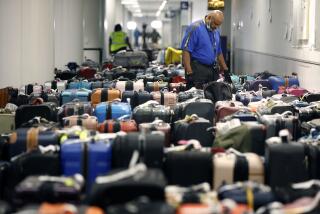3 Telecom Execs Vow Woes Wonât Disrupt Service
Executives from three telecommunications firms under investigation for faulty accounting told worried lawmakers Tuesday that their firmsâ legal and financial troubles will not disrupt service or leave customers stranded.
The executives, representing WorldCom Inc., Qwest Communications International Inc. and Global Crossing Ltd., gave the assurances during a Senate Commerce Committee hearing that was focused on ways to shore up the nationâs telecommunications industry. Federal Communications Commission Chairman Michael K. Powell also appeared to offer a critique of the situation and to recommend possible remedies.
Powell asked Congress to give the FCC the power to impose much higher fines on companies that misbehave in the market as well as the authority to force struggling Internet service providers to give customers 30 daysâ notice before shutting down, just as phone companies are forced to do.
Angry senators, however, found it hard to stick to the subject amid growing evidence that insiders at the troubled telecom firms reaped millions of dollars in stock sales, compensation and loans while their companies collapsed.
Committee members took aim at Global Crossing Chairman Gary Winnick, who pocketed more than $700 million by selling company stock, as well as former Qwest Chief Executive Joseph Nacchio, former Qwest Chairman Philip F. Anschutz and former WorldCom Chief Executive Bernard J. Ebbers, among others.
All the executives have profited handsomely from their tenures despite their companiesâ poor performances. WorldCom, the nationâs No. 2 long-distance provider, recently admitted hiding $3.9 billion in expenses and on July 21 filed the largest bankruptcy in U.S. history.
This week, Qwest said three years of accounting was flawed in ways that inflated revenues and understated some expenses. Given the scope and duration of the misstatements, people are questioning more than $500 million of stock sales made by Nacchio, Anschutz and others while the public got misleading financial data.
Global Crossing, which filed for bankruptcy protection Jan. 28, is under investigation for allegedly inflating revenue through sham transactions with other carriers, including Qwest.
âAll three corporations are either in bankruptcy [proceedings] or, in the case of Qwest, having to restate earnings to a tremendous degree, and stocks have tanked. Shouldnât you ask for that money back and distribute it maybe to the stockholders or to the employees who have been laid off or the retirees whose pensions have been wiped out?â asked Sen. John McCain (R-Ariz.).
Turning to Global Crossing CEO John Legere, McCain asked, âShouldnât Mr. Winnick be asked to give some of that $735 million back that he cashed in?â
Legere responded, âI believe legally, at this point in time, the company has no rights to the money that Mr. Winnick took unless he is seen to do something inappropriate.â The broader question, he added, âreally is one associated with the pain thatâs been caused to so many people.... I donât think thatâs a legal question. I think itâs a broader personal question that I canât answer. â
Qwest President Afshin Mohebbi and WorldCom CEO John W. Sidgmore skirted similar questions, noting that their firms will not take action until internal and government investigations are complete. If company executives are found to have broken the law, Mohebbi and Sidgmore pledged to pursue legal action against the individuals.
Given the growing uncertainty about their companies and the industry, all three executives also stressed that their operations are continuing without interruption, and that customers are not getting degraded service.
Despite facing $26 billion in debt and worries about its stability, Mohebbi assured the committee that âQwest expects to be around for a long time, and that the critical telecommunications services Qwest provides are not in jeopardy.â






